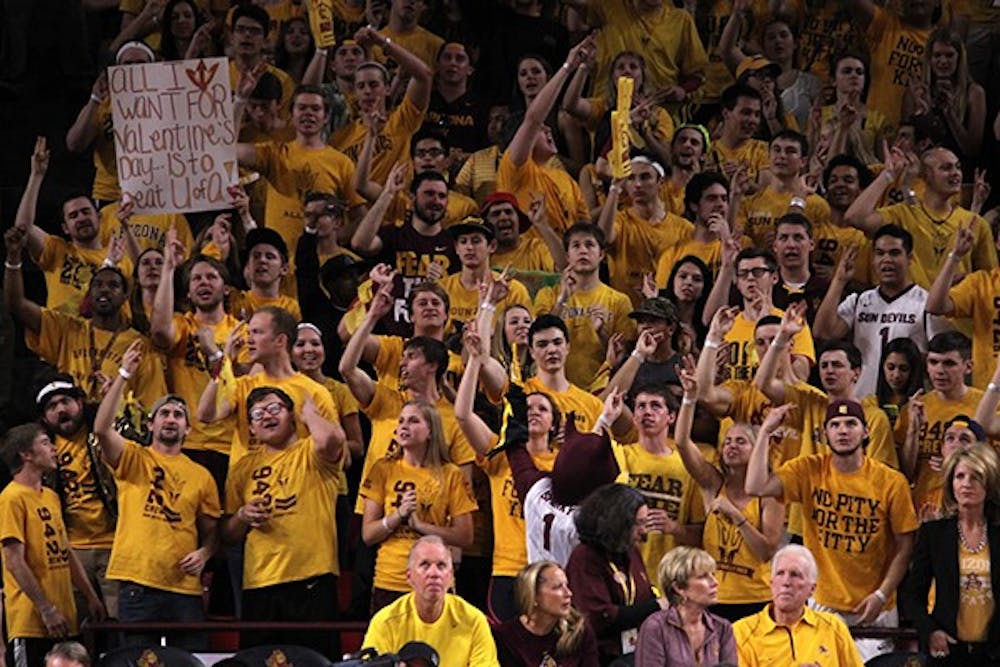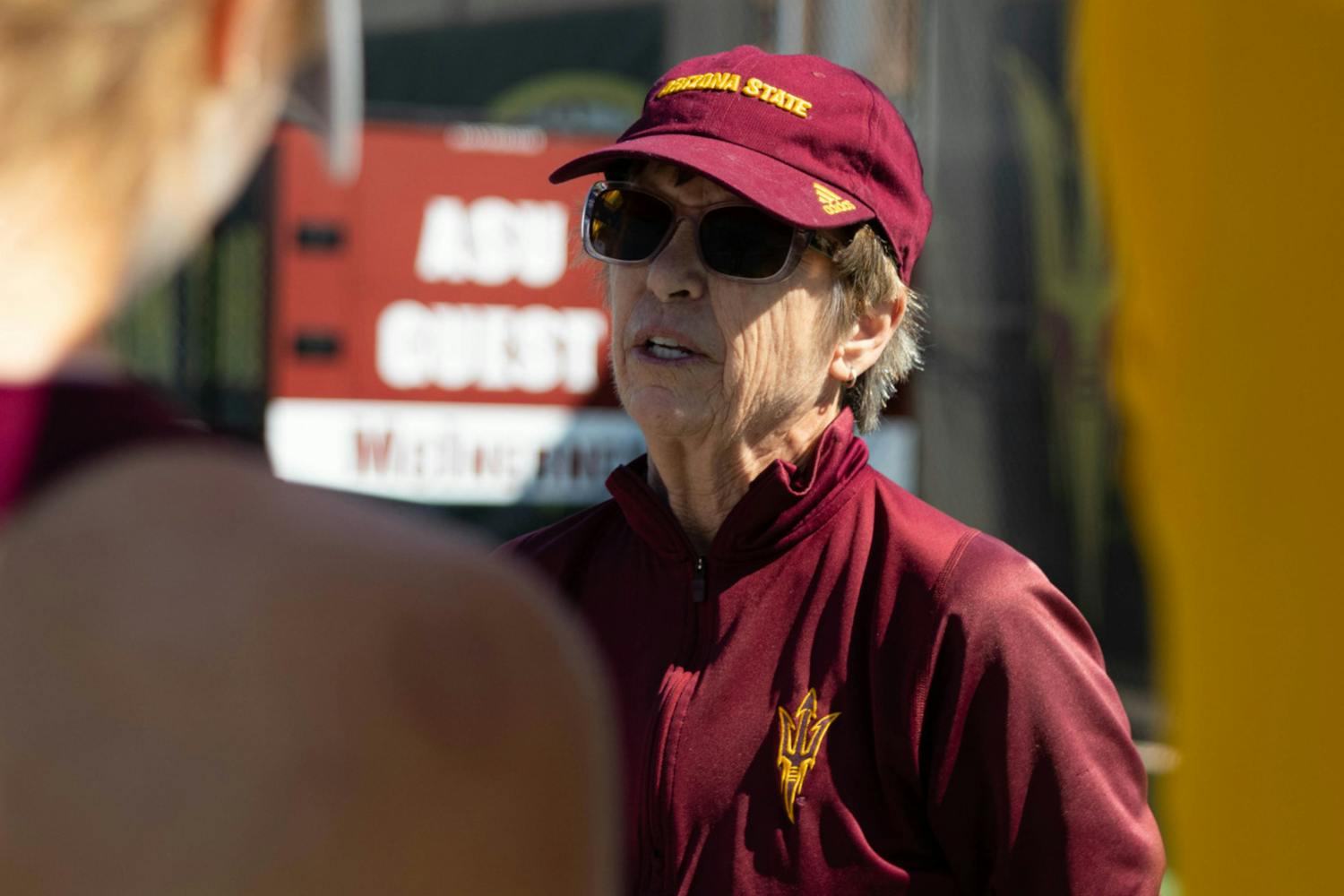
Sparky leads ASU students in a cheer at a men's basketball game on Feb. 14 against UA. (Photo by Alexis Macklin)
Reflecting a greater push toward sustainability goals, thousands of spectators at the ASU-UA men’s basketball game recycled or composted 1,364 pounds of trash that otherwise would have been sent to a landfill.
Sun Devil Athletics’ Zero Waste Initiative is part of a University-wide zero waste program ASU implemented. The goal of this initiative is to ensure that 90 percent of the crowd’s trash at every athletic event is either recycled or composted. The basketball game achieved an 87 percent diversion rate.
Maggie Emmons, information specialist for Sun Devil Athletics, said the department faced a challenge in encouraging thousands of spectators to make sustainable decisions at the game.
“The way to convince people is to make it normal,” she said. “You don’t want to throw people out of their comfort zone.”
Throughout the stadium, teams from ASU’s University Sustainability Practices placed bins marked for compost and recycling. They also hung posters to explain what kinds of material belonged in each bin and hired “bin guards,” who answered any questions spectators had about the program.
"It might be a little unsettling to people that we're going to start removing trash cans, but we've educated people enough to the point that if a trash can is missing, that's not a problem because all the stuff they have can go in either category," Emmons said.
In addition, Emmons said this initiative encouraged vendors who work with the University to introduce green projects to their own business models.
“They really bought in and changed a lot of their internal practices, which isn’t an easy thing to do,” she said. “It was great to see that buy-in on all different types of levels.”
Emmons said athletics is the first department at ASU to tackle the University’s Zero Waste Initiative because sports events enjoy more media coverage than other areas of the school.
“We’re the window into the University,” she said. “Athletics has a lot of attention put on it, so if we can use that to benefit the University, then we’re going to promote some of the great initiatives.”
Corey Hawkey, program manager of the Zero Waste at ASU Initiative, said the sustainability project at games and matches are the beginning of a larger effort to make ASU green-friendly.
“Dr. (Michael) Crow has this incredible vision for sustainability and has challenged the University to put itself at the forefront of the issues facing our local and global communities,” he said.
Hawkey said zero-waste programs will continue to be present at all ASU athletic events and there is no set deadline to end the initiative.
 Two fans cheer at a men's basketball game on Feb. 14 against UA. (Photo by Alexis Macklin)
Two fans cheer at a men's basketball game on Feb. 14 against UA. (Photo by Alexis Macklin)
“We have installed the zero-waste infrastructure at all ASU athletic events,” he said. “So, anybody going to a basketball, baseball (or) softball game will be exposed to the Zero Waste program.”
In addition to sports events, this initiative is expected to influence other areas on campus. Hawkey said the program can only be effective if students and faculty choose to cooperate with its objectives.
"In order to achieve this goal, nearly everybody on campus is going to have to play their part," he said. "It's going to take a considerable effort for us to do that."
Nicholas Brown, director of University Sustainability Practices at ASU, said USP represents a special team within the Global Institute of Sustainability that puts the school’s ideas into action on campus.
Beyond athletic events, USP collects food scraps from four of the six dining halls on the Tempe campus. Brown said these efforts result in diverting 40 tons of compostable material from landfills every month.
To achieve these numbers, kitchen staff place organic material into bins while preparing meals so that no scraps go to waste. Also, when students return their plates to the kitchen, those food materials are composted as well.
Additionally, USP plans on applying zero-waste programs to the Memorial Union at the Tempe campus.
“We’re going to move in the MU over the next few weeks,” he said. “I’m really proud of that, because that’s been the final frontier of organic food scraps for us.”
Brown said he and his team will remove a number of trash cans in the facility and replace them with either recycling or composting bins.
“We’ll have only a few trash bins here and there to signal the idea that most of what you have when you’re eating is either compostable or recyclable,” he said.
For the future, Brown said the University’s Zero Waste Initiative will be applied to multiple events at ASU. For example, the coming Clinton Global Initiative University 2014 conference and a number of ASU Staff Appreciation Barbeques are expected to be zero waste.
Brown said he hopes students on campus will learn more about the zero waste program in coming weeks. USP utilizes teams to raise awareness about the push to make the transition on campus as smooth as possible.
“(They) help promote zero waste among students who probably don’t have any idea of what it is, how to do it or that it’s important,” he said. “We have a lot of creativity and a lot of things that we’re working on to support our zero waste efforts.“
Reach the reporter at shari.rose@asu.edu or follow her on Twitter @sharir55




